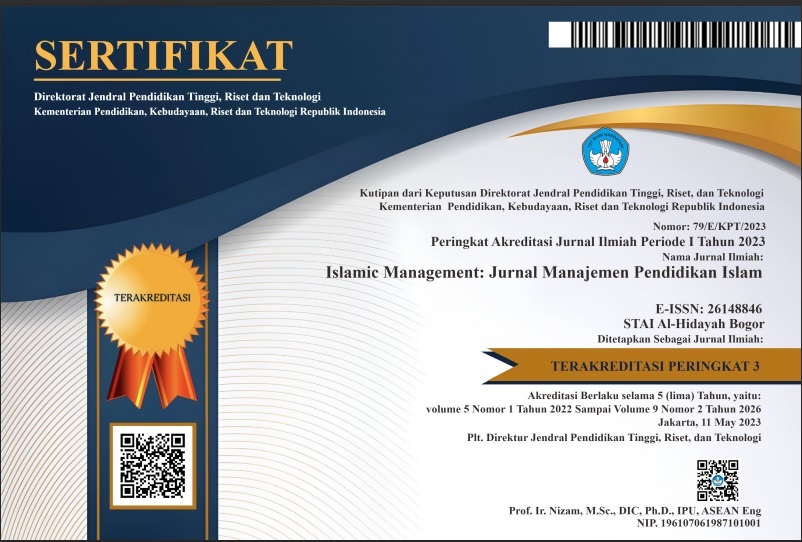ANALYSIS OF THE CONCEPT OF MORAL EDUCATION THOUGHT BUYA HAMKA AS AN EFFORT TO PREVENT BULLYING SELF-STUDY
DOI:
https://doi.org/10.30868/im.v8i01.8324Keywords:
Moral Education, Preventive Efforts, BullyingAbstract
Today's education has increasingly seen moral decadence and loss of social values. One of the most urgent is bullying. In line with that, the role of moral education is needed, because morals are the benchmark of a nation both in civilization and progress. Islamic morals are known as akhlaqul karimah, namely noble behavior or morals, namely behavior or character in accordance with the Qur'an and Hadith which are the main sources of religious law. Similar to Hamka's moral education which focuses on reason and akhlaqul karimah. In connection with this, this research is intended to be able to find answers from the analysis of Buya Hamka's moral education thoughts contained in his writings as a preventive effort from bullying behavior. This research was conducted using the library research method or literature study as the basis for this research. Literature studies that become references are from the book 'Philosophy of Life and Akhlaqul Karimah' and other works that intersect with Buya Hamka and the results of previous studies in the form of journals as other sources. Since this is the core of all behavior, the results of studies that provide insight into the virtues of all people are very important for their daily lives. It will be easier for people to get along and develop a great human personality if the origins of this trait are understood, along with the difficulties they face, so that they can place their temperament in the right position. The values that humans develop truly originate from within, and if disturbed, the situations within humans are not much different from how they are dealt with in the human body. Therefore, it is important to understand this in order to find a solution quickly. After that, virtue is used to name the basic nature of all thoughts. 'Iffah, Shaja'ah, 'Adaalah, and Hikmah are these qualities.
References
Antonius P.S. Wibowo. Penerapan Hukum Pidana dalam Penanganan Bullying di Sekolah. Jakarta: Universitas Katolik Indonesia Atma Jaya, 2019, hal. 9
Ardiyansah, D. F., Azani, M. Z., & Th, S. (2022). Pendidikan Akhlak Dalam Kitabul'Adab Dan Implementasinya Di Pondok Pesantren Asy-Syifa Sukoharjo (Doctoral dissertation, Universitas Muhammadiyah Surakarta).
Azprevention. (2017). Hot topics: Bullying behavior among school children. Arizona Prevention Resource center.
Dewi, P. Y. A. (2020). Perilaku School Bullying Pada Siswa Sekolah Dasar. Edukasi: Jurnal Pendidikan Dasar, 1(1), 39-48.
Espino-Preval, M., & Rivero-Favier, M. Bullying: Psychopedagogical Advisory Actions for Its Treatment in the School Context. International Journal of Social Sciences and Humanities, 8(1), 1-10.
Faray, M. R. (2018). Metode Pendidikan Akhlak Anak Dalam Keluarga Komparasi Pemikiran Hamka Dan Zakiah Daradjat (Master's thesis, (Jakarta: FITK UIN Syarif Hidayatullah Jakarta).
Hamka, Falsafah Hidup (Jakarta: Republika Penerbit, 2016)
Hamka, Lembaga Budi (Jakarta: Republika Penerbit, 2016)
Hamka, Tasauf Modern (Jakarta: Pustaka Panjimas. 1990)
Hamka. Akhlaqul Karimah. (Jakarta: Gema Insani, 2017)
Jasmine Nurul, Wulandari Hayani. 2023. “Bullying Verbal Menyebabkan Trauma Terhadap Anak TK.” 9(16):363–74.
Juarman, J., Susanto, H., & Kurnianto, R. (2021). Konsep pendidikan akhlak menurut Buya Hamka dan Ibnu Miskawaih serta relevansinya terhadap pengembangan Pendidikan Islam. JMP: Jurnal Mahasiswa Pascasarjana, 1(1), 37-74.
Mohammad Akhsanulkhaq, “Membentuk Karakter Religius Melalui Metode Pembiasaan”, (Kudus: Jurnal Praksa Paedagogia, Vol. 2 No. 1, Juni 2019), hlm. 22.
Nunuk Sulisrudatin, “Kasus Bullying dalam Kalangan Pelajar (Suatu Tinjauan Kriminologi), Jurnal Ilmiah Hukum Dirgantara, Fakultas Hukum UniversitasSuryadarma, Vol. 5, No. 2, (Maret 2015)
Pepler, D. J., Craig, W. M., Connolly, J. A., Yuile, A., McMaster, L., & Jiang, D. (2006). A developmental perspective on bullying. Aggressive Behavior: Official Journal of the International Society for Research on Aggression, 32(4), 376-384.
Putri, E. D. (2022). Kasus Bullying di Lingkungan Sekolah: Dampak Serta Penanganannya. Keguruan, 10(2), 24-30.
Putri, S. (2021). Internalisasi nilai-nilai akhlak dalam mencegah perilaku Bullying pada siswa kelas V di MIS Bidayatul Hidayah Kec. Percut Sei Tuan Kab. Deli Serdang Sumatera Utara (Doctoral dissertation, Universitas Islam Negeri Maulana Malik Ibrahim). hal. 1
Sani, A. (2017). Konsep Buya Hamka Dalam Pembinaan Akhlak (Perspektif Pemikiran Tasawuf Buya Hamka). Skripsi. Universitas Muhammadiyah Makasar. hal. 7
Schott, R. M., & Søndergaard, D. M. (Eds.). (2014). School bullying: New theories in context. Cambridge University Press.
Suci, M. N., & Ibrahim, R. (2023). Penanaman Nilai-Nilai Pendidikan Akhlak Sebagai Upaya Preventif Tindakan Bullying di Boarding School. Tahdzib Al-Akhlaq: Jurnal Pendidikan Islam, 6(2), 308-322.
Undang-undang Sistem Pendidikan Nasional Nomor 20 Tahun 2003 Tentang Sistem Pendidikan Nasional, 1.
Wiyani, Ardy Novan. 2012. Save Our Children from School Bullying. Yogyakarta: Ar-ruzz Media
Yunianti, C. (2023). Reaktualisasi Pendidikan Akhlak Dalam Upaya Pencegahan Terhadap Maraknya Isu Bullying Di Dunia Pendidikan. Pendas: Jurnal Ilmiah Pendidikan Dasar, 8(2), hal. 4211
Downloads
Published
How to Cite
Issue
Section
Citation Check
License
Copyright (c) 2025 Muthiah Arifah, Mohammad Zakki Azzani

This work is licensed under a Creative Commons Attribution-ShareAlike 4.0 International License.
Authors who publish with this journal agree to the following terms:
- Authors retain copyright and grant the journal right of first publication with the work simultaneously licensed under a Creative Commons Attribution License that allows others to share the work with an acknowledgment of the work's authorship and initial publication in this journal.
- Authors are able to enter into separate, additional contractual arrangements for the non-exclusive distribution of the journal's published version of the work (e.g., post it to an institutional repository or publish it in a book), with an acknowledgment of its initial publication in this journal.
- Authors are permitted and encouraged to post their work online (e.g., in institutional repositories or on their website) prior to and during the submission process, as it can lead to productive exchanges, as well as earlier and greater citation of published work (See The Effect of Open Access).






